|
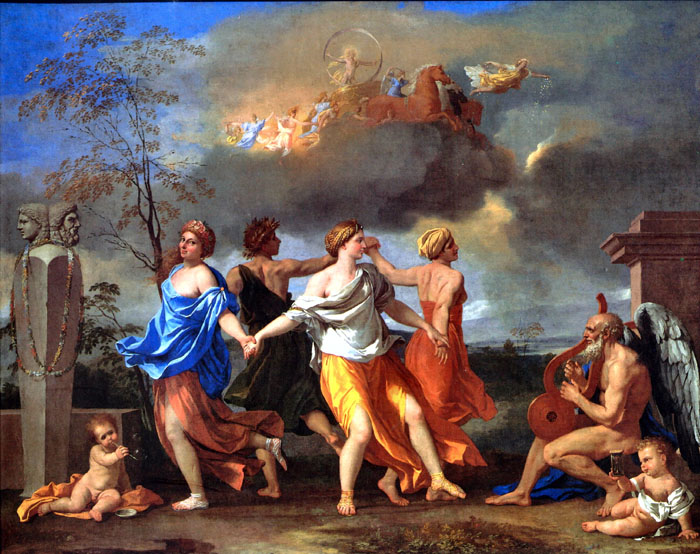
The Dance To The Music
Of Time (Nicolas
Poussain c.1640) -- earlier cycles above dictate our later dance below
From
Leaf to Tree – Fractal
Resonance Across Time
By
John Townley
A
physical structure of astrology
based on environmental entrainment through ageless gravitational
repetitions/cycles that step down serially to the individual is fairly
easy to
surmise. Indeed, the very orbital resonances and gravitational
structures such
as Lagrange points and harmonic
orbital interaction are so similar to what is seen in astrology that
the
relationship of one to the other, from out there to down here, may seem
quite
obvious. At least, it seems so with the overall picture of the main
planetary
aspects (which likely derive from Lagrange point stability, or lack of
it) and
transits to the natal chart. As above, so below – at various
windows of
scaling, from light through music, down through infrasound and finally
planetary-scale periods – would seem to be the clearly
operant
principle.
Developing approaches to this are outlined in Toward A Physical Basis for
Astrology,
in The
Moon On Deck, also in Windowpanes and Many
Rainbows.
But the use of progressions
–
whether the usual secondary or less common minor, tertiary, and
converse –
doesn’t immediately hook in to simple gravitational models.
It
appears unique
to astrology, and it is baffling in that it equates multiple time
scales to one
another, nested like matrioshkas,
instead of spatial ones. In secondary
progressions, where the first
year of
life is equated to the first day, the second to the second, and so on,
inner
(mostly) events of an entire real-time lifetime are summed up serially
in the
events of the first three months of life. Here, a diurnal return equals
a solar
return.

Progressions are like so
many time-keyed
matrioshkas, earlier mirrored in later
Although
secondary progressions
are the most popular there are others. In minor
progressions,
one lunar
month after birth equals one year of life, so a lunar return in minor
equals a
solar return in regular time. In tertiary
progressions, one day after
birth
equals one lunar month of life, so a diurnal return in regular time
equals a
lunar return in tertiary. And converse
progressions, which are
usually
secondary-based but theoretically could use minor or tertiary, actually
start
with the birth and work backward in time. Aside from the arbitrary
hookup of
one cycle (diurnal, lunar, or solar) being equated to another, what
physical
basis is there in real time as we know it, or is there any at all?
The
simplest, most common explanations, that progressions
(secondary) represent early inner learning and development in the
infant that
somehow surfaces at prescribed points later in adulthood, has
psychological
appeal but makes
no physical sense
at all. The same may be said about
minor and
tertiary, though their periods extend further into childhood. Even if
these
periods do describe early childhood development as transits, how are
their
manifestations
neatly deposited so that they manifest at specific, known times in the
future
according to these cycle equivalencies?
The
answer may be that although the earlier celestial events
may seem to precede and foreshadow the later reality, suggesting one
should
look for a linear before-and-after, cause-and-effect relationship, the
actual situation
is all
of
a piece, fractal, and
mutually self-reflecting in what may be a multidimensional
temporality. In a single,
simple analogous image, the
veins in
the very first leaves of a single-branched sapling directly foreshadow
the
shape and complexity of the giant, many-branched tree that lies in the
future, not because one leads to another, but because they are both
part of a larger evolutionary picture.
In fact, in a loose parallel to progressions, early tree branching
indications
can actually be used to forecast later full tree size and biomass [see fractal
branch analysis]. Indeed, to be
specific, “The
angle between the
main branches of a
tree & its
trunk remains constant in each species- and this same angle is found
between
the principal vein of the tree's leaves & all its subsidiary
branching
veins.”
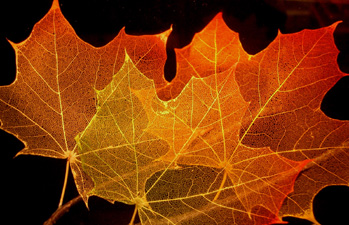 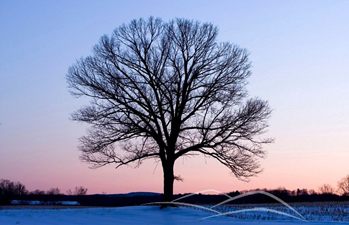
From leaf to tree -- the
shape of a leaf on
a sapling maple foreshadows the final shape of the tree...progressions
are similar
That, of
course, works in living things where early growth
often mirrors overall evolution (such as the development of the human
fetus
seems to mirror progressively more recent forms of life as it
matures).
But astrology isn’t just about humans,
or
even living things. Compared to the planets, we’ve come late
in
the game and
are, if anything, a result of their harmonies or dissonances. That very
thought
leads directly to what progressions most likely truly are: fractal
resonance
down through time, innate in
the very mix of natural cycles that
abide
across
time. There is a direct resonance between cyclical reversal of day and
night,
the diurnal rhythm that sets the tides, the monthly (lunar) cycle which
modifies the tides, and the yearly reversal of summer and winter that
sets the
tides of temperature and all else that seasonally drives across the
planet. Together,
they make
up a set of rhythms that we see clearly (the daily, monthly, yearly),
the
primary tonal drivers, plus the ones we don’t see so clearly,
which are the
interactive overtone series created by the mix.
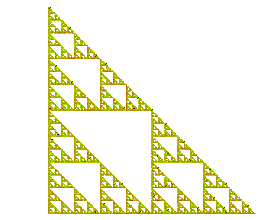
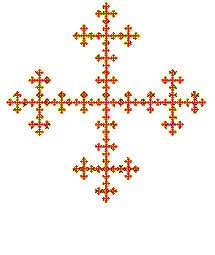
Basic
fractal structures in leaves, tree
branches, and all self-similarities apply in space, and time...
It’s
very much the same as the tones of a simple three-note
chord on a stringed instrument. We can hear each note sounded one at a
time and
recognize them as such, but when sounded all together, there are a
whole series
of overtones that make that chord rich which we don’t easily
identify at all,
but which can be mathematically demonstrated or clearly shown on a
recording
device. They are what make the chord more than the sum of its notes,
the blend
that makes it swell and resonate. In a planetary system such as ours,
exactly
this sort of resonance occurs, gravitationally and magnetically, and it
is the
primary substrate of our existence. We evolved according to its rhythms
and
that life is most successful which most effectively surfs along its
peaks
and valleys
– it is the very picture of our evolution, and hence the
fractal
similarity not
only across space, from large to small, but across time, from then till
now,
now till then, in both the greater and the lesser.
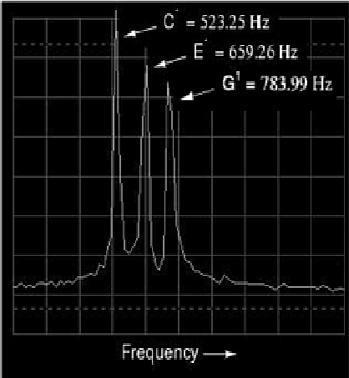 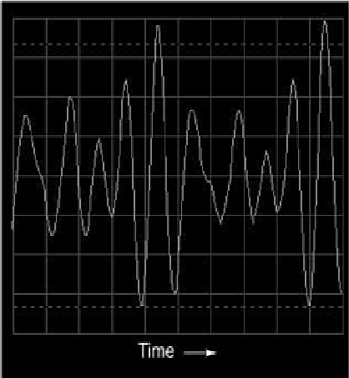
Three
simple notes (l) make a complex chord (r) -- graphs of combined
planetary (and market) cycles look much the same
But back to
progressions – the
progress of one cycle is directly
mirrored backwards and forwards by another, since they are interlinked
and form integral resonant harmonics with one another,
in patterns that span eons, so you
will see the parallel in events that reflect the
interaction well in front or behind of the specifics that generate
them. Thus you would expect to hear faint, internal echoes of the
shorter
rhythms (diurnal and lunar) laid on like an overtone series upon the
large (solar) as the years go by, with the smaller riding the larger
like fluctuations on a carrier wave.
And what
aspects of these
should you notice most? Those should be
the full-cycle rhythms, the strongest resonant octave drivers where a
reinforcing cycle
completes in the smaller and echoes down through the larger: in the
case of
secondary progressions, these would be progressed lunations, which
should then
be further amplified by the transiting Saturn cycle of almost exactly
the same
length (29 ½ years). And that
is
precisely what you see in
secondaries, where the most obvious
events occur
on the lunar cycle and its progress, and real but less obvious ones in
the
fractional stages of cycles that don’t complete within our
lifetimes, such as
progressed planetary sign changes and non-lunar progressed aspects.
So
there
you have it, the essence of a
physical basis for progressions,
the
missing key to a major astrological mystery. But you may, like most,
have a
hard time wrapping your head around how time itself
could be fractal, or
even
(dare we
say?) multi-dimensional -- which is essential to this physical basis
for progressions, wherein resonance causes the smaller to resemble the
larger not in space but in time -- like that leaf and tree analogy.
Both are areas of serious discussion, in
science,
mathematics, business investment (!), and of course generally on the
fringe.
Here’s some further places to look, or just Google
“fractal
time” or “time
fractals” for a smorgasbord of takes:
Time
Triads (in trading)
Fractal
Time/Space Supersymmetry
– (don’t forget that all the
2012 stuff,
including fractals, is based on an arbitrary starting point, which
happens to
dovetail at 2012. Pick another set, and it’s totally
different)
Fractal
Time
by Susie Vrobel – one of the more rigorous
science/mathematical
proponents…
Fractals
and Time: Not as Fluffy as You Think, Part I
– nice review of
the idea
and writers on it.
A
Fractal Topology of Time
– a dissertation on the subject or
watch the
9-part video
Fractal
Time (blog) – a fun
take from a blogger…
The
Human Social Experience Forms a Fractal –
An Elliott Wave expert
weighs
in…
Fractal
Resonance a video showing how
temporal acoustic resonance actually
turns into a spatial fractal (something Helmholtz originated way back
in the 19th
century)
Fractal
Scaling
Models of Resonant Oscillations in Chain Systems of Harmonic Oscillators
– Now, this is how it really
works…
Not
a
newsletter subscriber already? Subscribe
Free Here!
--
Breaking news from
around the globe, plus articles, reviews, it's all happening there,
changes daily...
|

